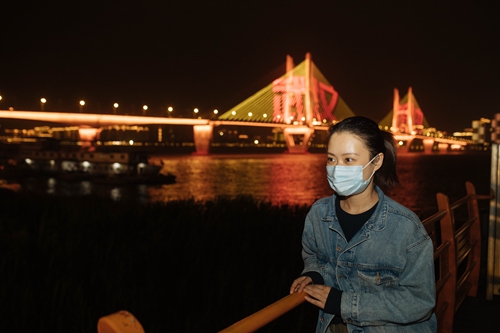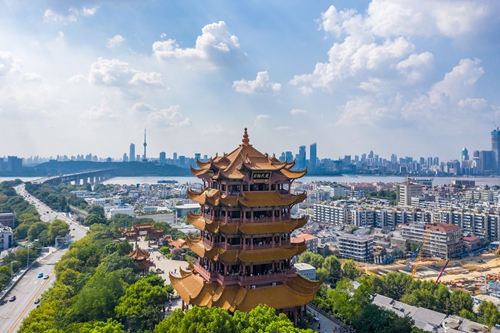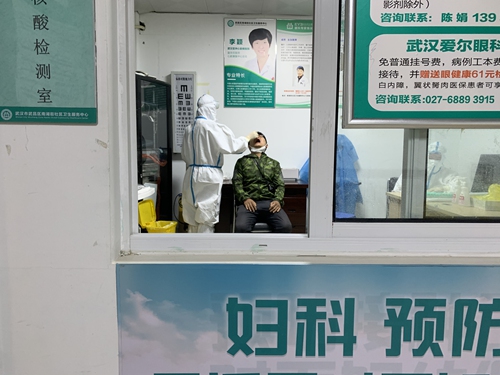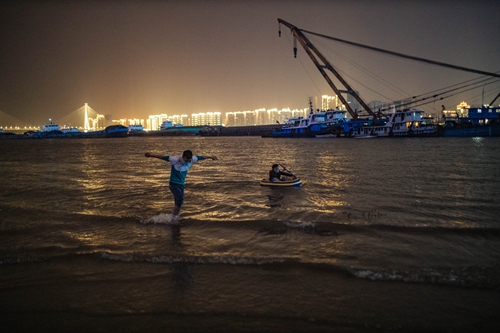An impermeable, yet safe trip home of GT reporter from Wuhan
By Zhao Yusha Source:Global Times Published: 2020/5/20 19:53:40
Editor's Note:
Wuhan has been revived from the deadly COVID-19 epidemic, but normalcy will never fully erase the memory of experiencing the catastrophe.
From the very beginning of the outbreak, Global Times (GT) reporters have stationed on the frontline in Wuhan.
GT photographer Cui Meng arrived in the city on January 30 and stayed more than 80 days to record the medical staff and patients in this special battle. Reporter Zhao Yusha and photographer Li Hao reached Wuhan in early April, right before the city's reopening.
They helped record and share the struggle and hope of the people as the city came back to life. Back in Beijing, they are willing to write down the memories from their past months on the frontline.

The four-hour, 1,100 kilometer journey from Wuhan to Beijing may have felt like hopping on and off a train ride before the COVID-19 pandemic. The trip for us was, however, was much more intricate in the midst of the government's orchestrated virus prevention plan to guard the capital from contagion.
It was the end of April, a week before our scheduled time to go back to Beijing, when three of my colleagues and I began packing up.
It was only before we were about to leave the city hardest hit by the epidemic in China that we came to know that entering the city was the easiest part.
Setting off
Under Beijing government's disease control requirements, any returnee from Wuhan must first submit their basic information, including ID number, and health information on a WeChat program, Jingxin Xiangzhu. The program was administered by the municipal government to screen returnees.
"This is the easy part. Anyone without criminal record can be approved," my community's committee official told me.
The next step was to do a nucleic acid test. By the end of April, Wuhan already developed systematic nucleic acid testing capacity. We went to a small community hospital where they were able to test hundreds of people a day and attain results within two days.
For returnees to Beijing, the nucleic acid test is only valid for seven days.
When we were standing outside the test room, a couple in their 70s approached. The lady whispered to me at a safe distance, saying "I heard it was quite painful, like a penicillin injection." Having not experienced this, I wanted to be honest with her as I didn't know how it felt, but my heart started bouncing during the test.
Being probed by a swab from in your nose and another in your throat was just a minor inconvenience compared to what others experienced. Zheng Shuqian, a Wuhan doctor, told me that for suspected patients, or patients who were to be discharged from hospital, the swab goes into their mouth to collect saliva.

"It's more accurate. But it cannot apply to everyone as some may puke out of being uncomfortable. An open mouth adds the risk of contagion for medical workers," said Zheng.
After the nucleic test, we rushed to the residential community that administered our hotel.
The residential community served as a very important role in virus prevention management and in organizing trips for travelers when the virus receded.
The Wuhan community committee office was in charge of collecting our information, including scheduled return date, nucleic acid test result and other related tasks, before reporting them to our Beijing communities.
From the Wuhan community, we discovered the Beijing government was limiting the daily number of returnees from Wuhan. Before May 3, many trains were available, but after May 6, the number of trains was gradually reduced, and returning to Beijing would be more difficult, said the Wuhan community committee official.
We constantly were informed by others that the ticket was notoriously difficult to get with some having to wait one month to buy one.
Train tickets cannot be purchased in the usual way, but only by applying for them on the Jingxin Xiangzhu program. To get the ticket, we stayed up until 2 am and woke up at 7 am for several days trying to enter the system. But all attempts ended up with the same result from the program: "Your application has failed."
It was then when I began to sympathize with those who were stranded in Wuhan before the lockdown and those whose complaints I had believed were overblown. At that moment, I was one of them.
Our anxiety culminated on April 30, as my nucleic acid test result was set to expire on May 4.
Finally, that afternoon, three of us got text messages at the same time from China Railway Corporation saying that we were able to purchase ticket. One of my colleagues was so excited that he forgot he was driving in the middle of the road. He was able to avoid an accident. Although we were about less than one kilometer away from the hotel, he pulled over at the roadside and began to finally buy the tickets.
Beijing bound
The Wuhan train station on May 3 was the least crowded train station I had ever seen in China.
Some people wore two masks, fully equipped with protective suits, gloves and plastic headgear. But they were all sparsely spaced in the enormous station, practicing social distancing when queuing up for inspection at the entrance. One can only enter after having one's nucleic acid test paper, ID card, and green code checked.
Hand disinfectant was installed everywhere in the train station, including one beside the auto ticket-selling machine.

We finally realized why tickets were so difficult to purchase after we boarded the train. Seats were carefully arranged to leave one seat between two passengers to keep social distancing. Dubbed the "special train," it was a nonstop express trip from Wuhan to Beijing.
The woman who sat on the same row as me did not take off her mask even once in five hours, not even to drink water. She just curled up in the corner with an N95 respirator, hats and protective suits covering nearly every part of her body, leaving only her eyes exposed. She rested her legs on her huge suitcase, thickly wrapped with plastic bags.
Neighborly care
When I exited the Beijing train station, I was immediately guided by people in white protective outfits. They herded us through temperature checks and separated passengers into smaller groups based on their destination.
A few hours later, a government-chartered bus dropped me off at my apartment complex. One of the security guards frantically darted off upon hearing I was from Wuhan. "Oh my, it's scary!" he shouted. But the two officials who escorted me were quick to admonish him, saying "We don't tolerate discrimination!"
Two officials took me to my door where I signed a paper promising I would stay inside, wouldn't go out, and have my temperature tested every day and report it to my community officials. After they shut my door, they put a new poster on my door imploring my neighbors to help supervise the quarantine, saying "Do not disturb her."
Ma Yue was the community official assigned to help me receive the delivery food I ordered online to my house every few days, and help me take out trash.
On the seventh day of my quarantine, she even texted me to ask if I was tired of cooking by myself and if I missed delicacies made by restaurants. "I will stop by your building later to bring you some take-out? You should give yourself a treat for finishing half of your quarantine," she texted. I politely refused partly to save her from climbing five stories of my building. "Thanks," I replied. "The only treat I crave for is to walk outside freely."

Sunday marks the last day of my compulsory quarantine. I was escorted by community officials to do my second nucleic acid test as stipulated by Beijing government. Any returnees from Wuhan must undergo a second test at the end of their quarantine.
The test was less uncomfortable than the one I did in Wuhan. The doctor probed the swab into my mouth down to my throat, which the Beijing doctor said was "improvement of the test method."
Being locked in my room for 14 days, my eyes were dazzled by sunlight when I walked out of my doorstep in the afternoon. My community committee officer sent me a happy face that said "your seal is finally removed."
But she said she has new tasks. "Now that there are less people returning from Hubei, we have to keep an eye on those from Northeast, where the contagion has resurfaced. Anyone from risky zone would also undergo a 14-day quarantine as the two sessions approach."
Deep in my heart, I wish the virus could subside as soon as possible and she, along with all the community committee officers in this country who silently contributed their fair share to the arduous virus battle, could catch a breath.
Wuhan has been revived from the deadly COVID-19 epidemic, but normalcy will never fully erase the memory of experiencing the catastrophe.
From the very beginning of the outbreak, Global Times (GT) reporters have stationed on the frontline in Wuhan.
GT photographer Cui Meng arrived in the city on January 30 and stayed more than 80 days to record the medical staff and patients in this special battle. Reporter Zhao Yusha and photographer Li Hao reached Wuhan in early April, right before the city's reopening.
They helped record and share the struggle and hope of the people as the city came back to life. Back in Beijing, they are willing to write down the memories from their past months on the frontline.

Zhao Yusha
The four-hour, 1,100 kilometer journey from Wuhan to Beijing may have felt like hopping on and off a train ride before the COVID-19 pandemic. The trip for us was, however, was much more intricate in the midst of the government's orchestrated virus prevention plan to guard the capital from contagion.
It was the end of April, a week before our scheduled time to go back to Beijing, when three of my colleagues and I began packing up.
It was only before we were about to leave the city hardest hit by the epidemic in China that we came to know that entering the city was the easiest part.
Setting off
Under Beijing government's disease control requirements, any returnee from Wuhan must first submit their basic information, including ID number, and health information on a WeChat program, Jingxin Xiangzhu. The program was administered by the municipal government to screen returnees.
"This is the easy part. Anyone without criminal record can be approved," my community's committee official told me.
The next step was to do a nucleic acid test. By the end of April, Wuhan already developed systematic nucleic acid testing capacity. We went to a small community hospital where they were able to test hundreds of people a day and attain results within two days.
For returnees to Beijing, the nucleic acid test is only valid for seven days.
When we were standing outside the test room, a couple in their 70s approached. The lady whispered to me at a safe distance, saying "I heard it was quite painful, like a penicillin injection." Having not experienced this, I wanted to be honest with her as I didn't know how it felt, but my heart started bouncing during the test.
Being probed by a swab from in your nose and another in your throat was just a minor inconvenience compared to what others experienced. Zheng Shuqian, a Wuhan doctor, told me that for suspected patients, or patients who were to be discharged from hospital, the swab goes into their mouth to collect saliva.

The Wuhan skyline Photo: IC
"It's more accurate. But it cannot apply to everyone as some may puke out of being uncomfortable. An open mouth adds the risk of contagion for medical workers," said Zheng.
After the nucleic test, we rushed to the residential community that administered our hotel.
The residential community served as a very important role in virus prevention management and in organizing trips for travelers when the virus receded.
The Wuhan community committee office was in charge of collecting our information, including scheduled return date, nucleic acid test result and other related tasks, before reporting them to our Beijing communities.
From the Wuhan community, we discovered the Beijing government was limiting the daily number of returnees from Wuhan. Before May 3, many trains were available, but after May 6, the number of trains was gradually reduced, and returning to Beijing would be more difficult, said the Wuhan community committee official.
We constantly were informed by others that the ticket was notoriously difficult to get with some having to wait one month to buy one.
Train tickets cannot be purchased in the usual way, but only by applying for them on the Jingxin Xiangzhu program. To get the ticket, we stayed up until 2 am and woke up at 7 am for several days trying to enter the system. But all attempts ended up with the same result from the program: "Your application has failed."
It was then when I began to sympathize with those who were stranded in Wuhan before the lockdown and those whose complaints I had believed were overblown. At that moment, I was one of them.
Our anxiety culminated on April 30, as my nucleic acid test result was set to expire on May 4.
Finally, that afternoon, three of us got text messages at the same time from China Railway Corporation saying that we were able to purchase ticket. One of my colleagues was so excited that he forgot he was driving in the middle of the road. He was able to avoid an accident. Although we were about less than one kilometer away from the hotel, he pulled over at the roadside and began to finally buy the tickets.
Beijing bound
The Wuhan train station on May 3 was the least crowded train station I had ever seen in China.
Some people wore two masks, fully equipped with protective suits, gloves and plastic headgear. But they were all sparsely spaced in the enormous station, practicing social distancing when queuing up for inspection at the entrance. One can only enter after having one's nucleic acid test paper, ID card, and green code checked.
Hand disinfectant was installed everywhere in the train station, including one beside the auto ticket-selling machine.

Li Hao during an nucleic acid test in Wuhan Photo: Zhao Yusha/GT
We finally realized why tickets were so difficult to purchase after we boarded the train. Seats were carefully arranged to leave one seat between two passengers to keep social distancing. Dubbed the "special train," it was a nonstop express trip from Wuhan to Beijing.
The woman who sat on the same row as me did not take off her mask even once in five hours, not even to drink water. She just curled up in the corner with an N95 respirator, hats and protective suits covering nearly every part of her body, leaving only her eyes exposed. She rested her legs on her huge suitcase, thickly wrapped with plastic bags.
Neighborly care
When I exited the Beijing train station, I was immediately guided by people in white protective outfits. They herded us through temperature checks and separated passengers into smaller groups based on their destination.
A few hours later, a government-chartered bus dropped me off at my apartment complex. One of the security guards frantically darted off upon hearing I was from Wuhan. "Oh my, it's scary!" he shouted. But the two officials who escorted me were quick to admonish him, saying "We don't tolerate discrimination!"
Two officials took me to my door where I signed a paper promising I would stay inside, wouldn't go out, and have my temperature tested every day and report it to my community officials. After they shut my door, they put a new poster on my door imploring my neighbors to help supervise the quarantine, saying "Do not disturb her."
Ma Yue was the community official assigned to help me receive the delivery food I ordered online to my house every few days, and help me take out trash.
On the seventh day of my quarantine, she even texted me to ask if I was tired of cooking by myself and if I missed delicacies made by restaurants. "I will stop by your building later to bring you some take-out? You should give yourself a treat for finishing half of your quarantine," she texted. I politely refused partly to save her from climbing five stories of my building. "Thanks," I replied. "The only treat I crave for is to walk outside freely."

Two men play in the water along the Yangtze River in Wuhan. Photo: Li Hao/GT
Sunday marks the last day of my compulsory quarantine. I was escorted by community officials to do my second nucleic acid test as stipulated by Beijing government. Any returnees from Wuhan must undergo a second test at the end of their quarantine.
The test was less uncomfortable than the one I did in Wuhan. The doctor probed the swab into my mouth down to my throat, which the Beijing doctor said was "improvement of the test method."
Being locked in my room for 14 days, my eyes were dazzled by sunlight when I walked out of my doorstep in the afternoon. My community committee officer sent me a happy face that said "your seal is finally removed."
But she said she has new tasks. "Now that there are less people returning from Hubei, we have to keep an eye on those from Northeast, where the contagion has resurfaced. Anyone from risky zone would also undergo a 14-day quarantine as the two sessions approach."
Deep in my heart, I wish the virus could subside as soon as possible and she, along with all the community committee officers in this country who silently contributed their fair share to the arduous virus battle, could catch a breath.